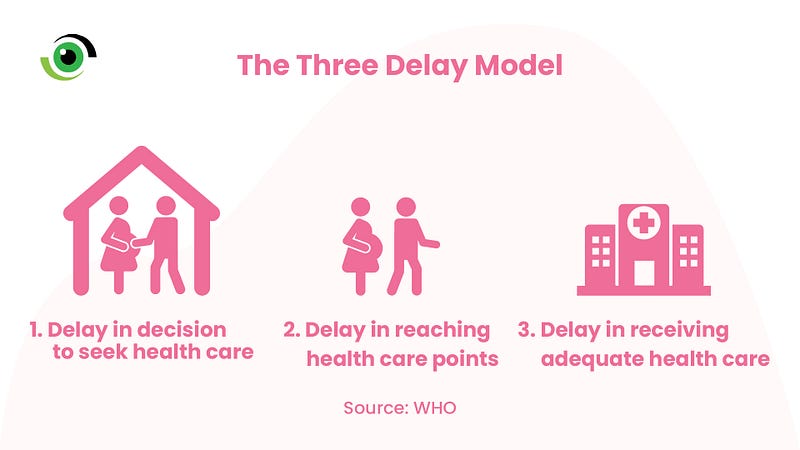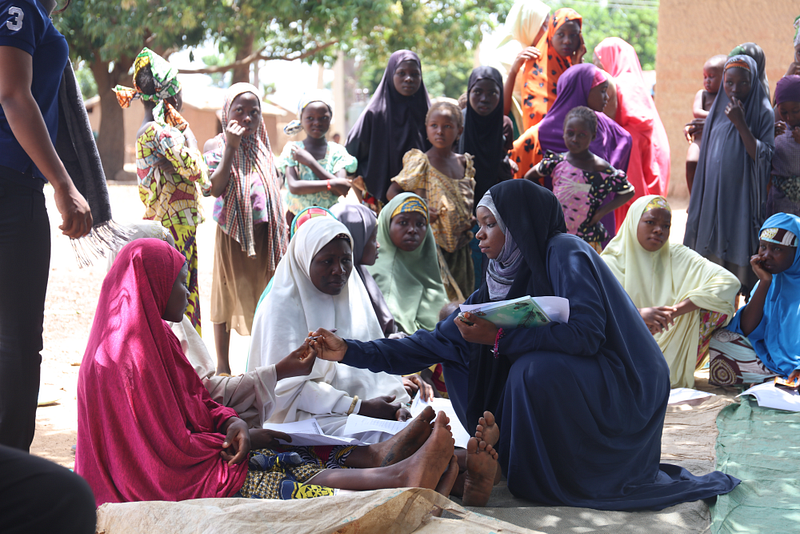Maternal mortality, according to the World Health Organisation (WHO) is the death of a woman while pregnant or within 42 days following the delivery or termination of a pregnancy. The WHO notes that Nigeria alone accounts for nearly 20% of global maternal deaths. Globally, maternal mortality remains a major public health concern, especially in poorly resourced and developing countries, including Nigeria. About 295, 000 women around the world reportedly died during pregnancy and childbirth in 2017, with sub-Saharan Africa accounting for 66% of the total deaths.
Limited Access to Skilled Maternal Health Care in Communities
In many communities across Nigeria, women continue to face barriers in accessing safe maternal health care during pregnancy. Some of these challenges include lack of adequate health infrastructures, lack of skilled birth attendants. Consequently, pregnant women increasingly patronise traditional birth attendants (TBAs) during childbirth to deliver their babies. A traditional birth attendant is a person who assists pregnant women when giving birth. But traditional birth attendants are unskilled: they lack formal training, adequate health information, and proper understanding of pregnancy complications and risk factors that lead to maternal deaths. They also lack access to requisite tools for clean delivery such as medicine and equipment for obstetric care.
Some of the reasons for the continuous patronage of traditional birth attendants could be attributed to the elements of the Three Delay Model which identifies three groups of factors — delay in decision to seek health care, delay in reaching health care points and delay in receiving adequate health care — that may hinder women from accessing the maternal health care they need.

Implementation of MPDSR in Nigeria
Since 2015, the WHO and UNICEF have recommended the institutionalisation of Maternal Death Surveillance and Response, MDSR to track and prevent maternal and perinatal deaths in countries around the world. The MDSR is a mechanism set up to examine the circumstances surrounding every maternal death. It is the continuous process of identifying, notifying, and reviewing maternal deaths as they occur, and implementing actions to improve maternal care and prevent future deaths. MDSR also helps track a country’s sum of maternal deaths and provide vital information such as cause of deaths, underlying contributing factors — as well as actions to address the contributing factors to prevent future preventable deaths. Thus, it plays a crucial role in reducing maternal deaths.
In Nigeria, the Federal Ministry of Health adopted the Maternal and Perinatal Death Surveillance and Response, MPDSR in November 2016. However, state-level implementation of MPDSR in Nigeria is inadequate, because it is focused on facility-based maternal deaths alone and sub-national MPDSR committees are unable to effectively turn the data into action. Consequently, this gap fueled the Giving Birth in Nigeria programme’s approach to carry out the review of maternal deaths in communities, with the involvement of family decision-makers, traditional leaders, religious influencers, health workers and government-level officers in inquiries, awareness, and dialogue.
Community MPSDR, as recommended in the “Why Are Women Dying While Giving Birth in Nigeria” report, will provide a mechanism for policymakers and other decision-makers to be well aware of the causes of maternal deaths and address these causes at all levels by creating actionable solutions that could reach women in local communities. As a framework for monitoring maternal deaths, it will ensure the timely reporting and surveillance of women dying while giving birth in communities.
Consequently, this vital information can be used to guide public health’s response and government action at all levels and prevent the occurrence of future maternal deaths in communities. Also, through community MPDSR, every maternal death at home, at a faith-based centre or with a TBA can be counted, assessed, and avoidable factors aggregated. The information generated can be used to guide the immediate implementation of solutions as well as long-term actions to reduce maternal mortality in Nigeria.

The “Why are Women Dying While Giving Birth in Nigeria?” Report: A Community-informed Maternal Death Review
An 18-month long programme for maternal deaths in Nigeria was launched in January 2019, under the theme: Giving Birth in Nigeria. It was implemented by a consortium of Africare, Nigeria Health Watch, and EpiAFRIC.
The programme, supported by funding from MSD for Mothers, was implemented to investigate why women are dying while giving birth in communities, to create a sense of urgency and use the data and insights from the review to catalyse accountability for the death of every woman in the country. The results of these findings are analysed in a community-informed maternal death review: The “Why Are Women Dying While Giving Birth in Nigeria?” report.
The report highlights Nigeria’s high maternal mortality burden, particularly the high prevalence of maternal deaths in communities, where there has been no previous systematic attempt to ensure that out-of-facility deaths were integrated into any routine review or what is formally known as the Maternal and Perinatal Death Surveillance and Response (MPDSR).
Recommendations for Community MPDSR in Nigeria
Community MPDSR is key to reducing maternal deaths in Nigeria. Following the findings of the “Why Are Women Dying While Giving Birth in Nigeria?” report, the following are some of the recommendations that were presented for reducing maternal deaths through the implementation of community MPDSR in Nigeria:
- State governments should leverage traditional and religious leaders and build upon existing socio-cultural structures to speed up accountability for maternal deaths at the community level, through community leadership, and advocacy for the adoption of safe practices in maternal care.
- Apart from working with state governments, local governments and ward councils should facilitate community MPDSR and the Federal Government of Nigeria through the Ministry of Health should implement MPDSR as a multi-stakeholder effort that will involve community influencers, community-based organisations (CBOs), religious leaders and health workers including community health extension workers.
- The government at all levels — federal, state, local — should put in place sustainable structures in local communities, so that community maternal death reviews are implemented and incorporated into state-level MPDSR efforts in health facilities, where this is currently practiced. This will ensure that comprehensive data on causes of maternal deaths at every level, are identified, addressed, policies are made, and sustainable solutions created.

Every day, women die while giving birth in Nigeria. This is tragic, with devastating consequences on the family — and it is unacceptable! Maternal deaths can be prevented provided that women have access to quality maternal care throughout their pregnancies and during childbirth and that every maternal death is counted, investigated and used to create solutions to prevent further deaths.
State and local governments need to do more to ensure that women have access to adequate health facilities in their communities. There is need for increased awareness and education on safe maternal health care practices among women and communities, as well as advocacy for effective implementation of community MPDSR in all states across Nigeria. Government must work with gatekeepers at the community level, including religious leaders, traditional rulers, women leaders and other community influencers to ensure that the death of every woman in the community is tracked, and solutions are established to ensure that no woman dies while giving birth.
The “Why Are Women Dying While Giving Birth in Nigeria?” report is an analysis of findings from a community-informed maternal death review that was implemented under the Giving Birth in Nigeria project. This project is sponsored by MSD for Mothers and implemented by Africare, Nigeria Health Watch and EpiAFRIC. The “Why Are Women Dying While Giving Birth in Nigeria?” report will be launched at a virtual meeting on Monday, 30 November 2020.



Thanks for the enlightening article. However l noted that much emphasis has understandably been placed on preventing avoidable maternal deaths. It will be good if the aspect of preventing avoidable perinatal and neonatal death is also brought to fore. Thanks
Community MPDRS is a good program.There should be a solution to the high maternal mortality rate in Nigeria
A very good effort to address the issue of maternal and perinatal death in a setting where limited resources,culture and in equalities in resource allocation lead to loss of mothers and babies.